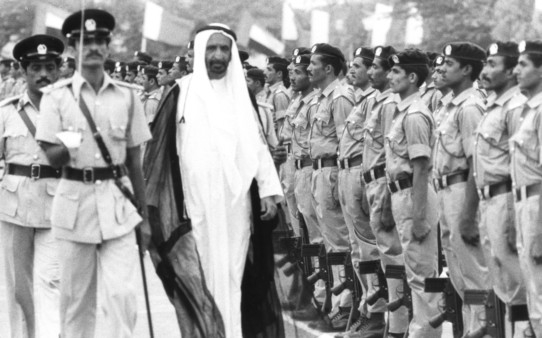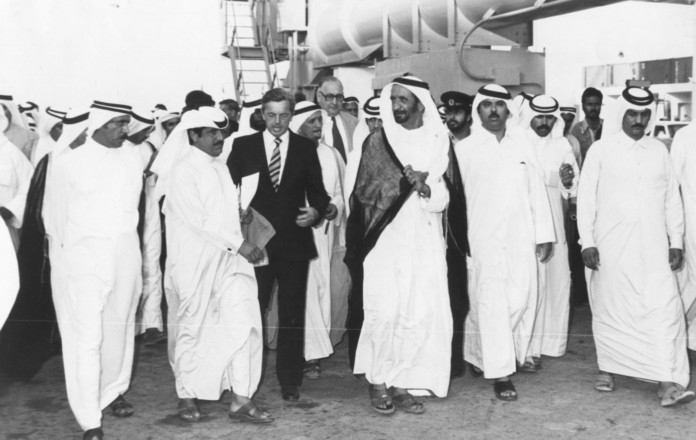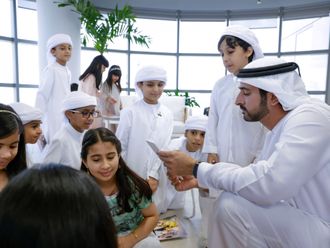
Abu Dhabi: Shaikh Rashid Bin Saeed Al Maktoum, the father of modern Dubai, was renowned for his generosity, philanthropy and helping the needy.
Shaikh Rashid (1912-1990), was Ruler of Dubai from 1958 till his death on October 7, 1990. He was also the Vice-President and Prime Minister of the UAE from 1971 to 1990.
Azza Bin Sulaiman, member of the Federal National Council from Dubai, said Shaikh Rashid’s generosity is mirrored in his siblings’ charitable and humanitarian work around the globe. “Almost every year, the Mohammad Bin Rashid Al Maktoum Global Initiatives contribute to a specific cause, including a campaign to provide over 16 million children and young people in 45 developing countries with access to quality education, a campaign to clothe one million children around the world in 2013, the Suqia drive to bring water to five million people in 2014 and the Reading Nation campaign to distribute five million books to children in refugee camps, schools and libraries around the world last year,” Bin Sulaiman said.
Bin Sulaiman added she shared the people’s saying that His Highness Shaikh Mohammad Bin Rashid Al Maktoum, Vice-President and Prime Minister of the UAE and Ruler of Dubai, inherited his father Shaikh Rashid’s vision of dreaming large and achieving big and of his charitable and humanitarian work.
The UAE Pioneers Award 2017 will fete 46 Emirati selfless philanthropists in a ceremony to be held on Tuesday (November 28), to reflect the UAE’s humanitarian approach since its establishment.
The award will mark the 46th National Day and the Year of Giving.
Shaikh Rashid, the eighth ruler from the Al Maktoum family, was loved and greatly respected by the residents of Dubai, as he ruled the emirate with compassion and with a clear vision of what was required to transform Dubai into a modern city. Driven by this vision, Shaikh Rashid accomplished what many believed to be impossible.
Bin Sulaiman said thanks to the founding fathers, the UAE is widely recognised today as a successful modern state that, starting from scratch just four decades ago, has managed to establish the foundations of a prosperous and advanced society.
In the early 1970s, Shaikh Rashid envisaged a town, seaport and airport focused on developing an industrial region in the emirate.
Bin Sulaiman said the spectacular achievements of the founding fathers — Shaikh Zayed Bin Sultan Al Nahyan and Shaikh Rashid Bin Saeed Al Maktoum — have allowed the country to assume a position of pre-eminence regionally and internationally; to play effective and responsible political and economic roles and to contribute to the stability and security of the region.
“Projects viewed as impossible by many members of society, including foreigners, were seen as challenges by Shaikh Rashid,” Bin Sulaiman said.
Shining examples of these projects are Al Maktoum Hospital, the first modern hospital in what was then the Trucial States; Al Maktoum Bridge, which spanned the creek, joining Bur Dubai with Deira and eliminating the long trip around the head of the creek; and establishment of Dubai airport.
These projects showed clearly that Dubai’s infrastructure planning was hardly ever just a response to the immediate needs of the community: it was clearly linked to the ambitious ideas about the future development of Dubai.
Shaikh Rashid also saw an industrial port as essential part of that concept and a key to Dubai’s development and industrialisation.
He personally chose Jebel Ali as the location for his new supersized port and even conceived an outline concept before involving his advisers in the planning, financing and construction of what was to become one of the world’s major ports.
Shaikh Rashid retained a personal interest in Jebel Ali Port long after it was completed and even after he became ill. He continued to visit Jebel Ali Port until he was no longer able to do so.
In 1985, Jebel Ali Free Zone opened as the UAE’s and the region’s first free zone and, over the years, this would become the template which competitor free zones would follow, establishing the backbone of UAE’s lucrative logistics sector. But, initially, Jebel Ali Free Zone was not the economic success story that it is today, establishing the UAE as a global logistics power broker.
As a child Shaikh Rashid received the finest education available in the region. Attending Al Ahmadiyyah School, Shaikh Rashid’s subjects included Islamic studies, Arabic, and arithmetic.
Shaikh Rashid’s hands-on approach called for a disciplined daily schedule. Twice daily he would tour Dubai to see for himself how the projects were progressing. Shaikh Rashid was never satisfied with a simple explanation; instead he wanted to have a detailed understanding of every project undertaken in Dubai. Furthermore, these inspections provided him with the opportunity to meet the man on the street.
After returning home in the evening, it was time to take on more official business in the traditional evening majlis, an occasion when the Ruler gives his people the opportunity to meet him and share problems or grievances. This duty was one which Shaikh Rashid took very seriously.
Shaikh Rashid was famed and admired for his patience on these occasions; he thoughtfully considered each man’s complaint or opinion, ensuring that proper assistance was given to each individual.
The majlis, a mix of citizens, also provided a vibrant stage for debate. Surrounded by men whose opinions he valued, projects were dissected, moulded, and often implemented by members of the majlis. Determined in his unfaltering belief that a modernised Dubai could be achieved, Shaikh Rashid initiated numerous remarkable developments in his city-state.
On October 7, 1990, Shaikh Rashid died but left behind a legacy visible in the town planning of Dubai.













